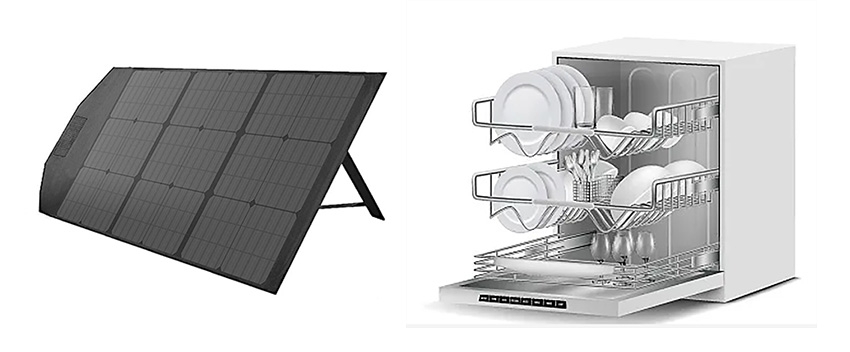Almost all dishwashers use AC power. Solar power produces DC power, so an inverter is needed to convert DC power to AC power. A 1500 watt dishwasher requires a 2000 watt inverter. Theoretically, a 1500 watt inverter is a perfect match, but due to inefficiencies, the system will require more power.
Power inverters are typically rated between 85% and 95% efficiency. This can have a significant impact on wattage usage. For example, a 1500 watt dishwasher uses 1725 watts on an inverter that is 85% rated at 1500 watts. 1500 × 115% = 1725. There is no 1725 watt inverter, and the closest size is 2000 watts.
Now if you run the same dishwasher through a 93% rated inverter the wattage is 1605 watts. 1500 x 107% = 1605. This is applicable not just for dishwashers but other appliances too. And this also shows why high conversion efficiency ratings matter.
This brings us to pure sine wave inverters and modified sine wave inverters. Most appliances run better on pure sine wave. For example, sensitive equipment and power tools should only use pure sine wave. For appliances, it's more of a case-by-case basis. Some dishwashers only use pure sine, but there are modified sine wave inverters that are acceptable.

Do You Need Batteries to Run Solar Powered Dishwashers?
An off-grid home needs a battery bank or a solar generator to run appliances. Solar panels can power almost any appliance, but when the sun goes down, another source of power is needed.
It takes a 250ah 12V battery to run a 1500 watt dishwasher for two hours. The battery will be 100% empty at the end of the dishwasher cycle. If you do not want the depth of discharge (DOD) to drop below 50%, increase the battery pack to 500ah.
You can use gel or lithium batteries. Lithium offers the best DOD rate but costs more. It really depends on how you run the dishwasher, whether it is off the batteries or solar panels.
You don't have to choose one of them. For example, you can connect a battery to a solar panel. The solar panel will charge the battery pack and you can use the batteries to power the dishwasher. As long as the solar panel is charging, the batteries won't cut out.
Another benefit of having a battery bank is you can store unused solar energy into it. This way you can tap into this during low solar power days.
How to Reduce Dishwasher Power Consumption?
- Dishwasher power consumption has gone down, but there are ways to save even more energy.
- Look for the most energy efficient dishwasher. So they might be worth checking out.
- Set the dishwasher settings to as low as possible.
- Do not use the hot drying option. Let your plates air dry naturally. The energy savings will be substantial.
- Reduce the number of cycles used. Keep the number to five cycles maximum. If you can lower this, that is even better.
- Set the dishwasher to economy mode or energy saving mode.
- It is recommended to use the dishwasher only when it is full. Running a half-empty dishwasher wastes a lot of energy.
- Avoid pre-rinsing to save on power usage. Remove large pieces of leftovers for easier and faster cleaning.
- And if it is possible, hand wash the dishes.
